Hello and welcome back!
I want to begin this week noting a distressing development, which seems to be just the latest in a series of attacks on religious freedom in our country.
This week it was announced that the Department of Health and Human Services’ Office of Refugee Resettlement would not be renewing a grant to U.S. Catholic bishops’ Migration and Refugee Services to help human trafficking victims obtain food, clothing and access to medical care. That work has now come to halt.
Sister Mary Ann Walsh, director of media relations for the U.S. Conference of Catholic Bishops, addressed this issue in a post yesterday to the USCCB Media Blog. I want to share that post with you here:
There seems to be a new unwritten reg at the U.S. Department of Health and Human Services (HHS). It’s the ABC Rule, Anybody But Catholics.
It showed up in a letter from HHS’s Office of Refugee Resettlement (ORR) to advise the United States Conference of Catholic Bishops’ (USCCB) Office of Migration and Refugee Services (MRS) that it would not receive a grant to continue its services for victims of human trafficking.
The USCCB program excelled because of its anytime-anywhere approach. It had extraordinary reach, something valued by people who work to free men, women and children from slavery. Because of USCCB’s organizational capacity, MRS could respond immediately. Should an Immigration Enforcement official find a vulnerable child, for example, a call to the MRS program got safe housing immediately. There was not the delay of weeks that one associates with programs that lack such a network.
The program worked well on the ground. but not so well for distant administrators promoting the abortion and contraceptive agenda, who bristle at the fact that in accord with church teaching, USCCB won’t facilitate taking innocent life, sterilization and artificial contraception. MRS anti-trafficking programs ran successfully for six years in harmony with these moral convictions until the American Civil Liberties Union brought suit against the government for not forcing the USCCB program to provide these services as a part of the program. The suit’s outcome is pending, but ORR apparently has made its own decision apart from any judgment of the court. So much for the Administration’s guarantee of conscience protection.
That’s the climate which allowed ORR to dismiss the USCCB proposal and instead award grant money to the United States Committee on Refugees and Immigrants, (USCRI), Heartland and Tapestri. ORR even awarded more money than it said it would in the original proposal.
ORR earmarked most of the money for USCRI. Eskinder Negash, current director of the ORR, had been vice-president and chief operating officer at USCRI before joining ORR in 2009.
The ORR’s request for proposals had stated that agencies receiving the money were to be fully operational ten days after being awarded the grant. That would have been October 10. One wonders how that could have happened since USCRI and Heartland reportedly were posting ads seeking to hire staff just a few days before that date. None of the three organizations has much depth of experience in monitoring and providing services. USCCB staff were given a number to call for a smooth transition for the people served by the anti-trafficking program. Those who called it found no one could answer their questions.
Trafficking of human beings is one of the great modern-day scandals, but at least until now, the U.S. government sought to sincerely address the issue. It asked USCCB for help when regional programs weren’t reaching victims outside the usual hotspots for trafficking. USCCB created an extraordinary program in conjunction with several partners, Christian and secular, including Lutheran Family Services, Jewish Family Services, Salvation Army, YMCA affiliates, domestic violence shelters, World Relief and others. Only one-third of its subcontractors were Catholic-affiliated, but with the USCCB infrastructure they reached virtually everywhere in the USA.
Now ORR seems to have yielded to abortion politics. It has undercut a worthy program, limiting the numbers served, while increasing the time and money it will take to serve them.
Apparently HHS rules about the benefits of experience and cost effectiveness can be waived. So can rules about being fully operational by a certain date. What can’t be waived is the new, albeit unwritten rule of HHS, the ABC rule – Anybody But Catholics.
– – –
Last Wednesday I attended the Archdiocesan Pastoral Council.
Among the topics we discussed was the Pastoral letter on Evangelization, and Janet Benestad was there to lead that discussion. It was a very valuable conversation.
We also spoke about the new pastoral letter that’s coming out on the Sunday Eucharist.
There are a number of members of the APC who completed their terms with that meeting. I want to acknowledge them here and thank them for their service:
Kathleen Allen, Armand DiLando, Michael Gilroy, Andrew Griswold, Deacon Philip LaFond, Peggy Mann, John Moran, Thomas Nuttall, Maureen O’Brien, Thong Phamduy, Suzanne Robotham, Deacon Louis Sheedy, John Sullivan, Patricia Tobin, Libby Yon, and Lynn A. Zofchak.
– – –
Among the new forms of consecrated life that have been restored in the Church after the Second Vatican Council, we have that of the hermits. These are men and women who make vows of poverty, chastity, and obedience and follow a rule of life that commits them to a very intense life of prayer and service, particularly works of mercy.
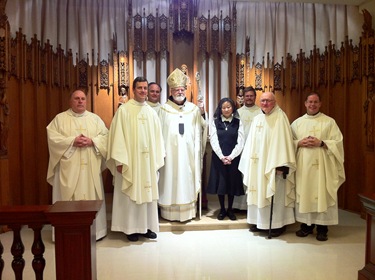
On Friday, I was pleased to preside at the profession of our latest hermit, Mary Therese Inoue.
Mary Therese has been prepared for a long time by Sister Marian Batho and by her work with the Oblates of the Virgin Mary. Many of the Oblates were there and concelebrated the Mass. Some members of her family were with us, as well.
– – –
Also on that day, I celebrated the funeral Mass of Msgr. Stanislaus Sypek, who was the pastor of St. Adalbert Parish in Hyde Park.
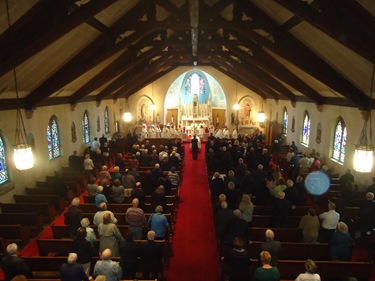
Msgr. Sypek was among the last group of priests ordained during Cardinal O’Connell’s era. He was 96 years old and was still an active pastor of St. Adalbert’s, which is a Polish national parish. He had been a personal friend of Blessed Pope John Paul II and a great leader in the community and was among the last pastors appointed by Cardinal Cushing in 1969.
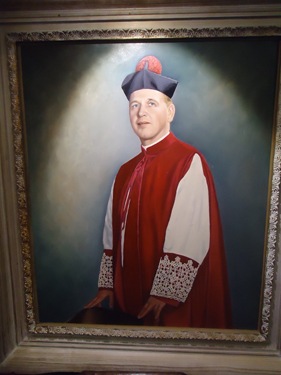
He was a very accomplished man; he had two doctorates. He was originally from New Bedford, but his family moved to South Boston. He was well known for all of the aid that he acquired and transmitted to the Church in Poland, as well as supporting orphans in the Holy Land.
The preacher at the Funeral Mass was Father Phil Hamel from New Bedford, who was a dear friend of Msgr. Sypek’s. Many members of Monsignor’s family joined us for the Mass.
He served as a pastor at St. Adalbert’s for over 40 years. Having been pastor for so long at St. Adalbert’s, certainly there are many people for whom he is was only pastor they had ever known. We know he will be sorely missed.
– – –
On Saturday, I met with Father James Socias of the Midwest Theological Forum of the Prelature of Opus Dei, which produces a number of Catholic catechetical and liturgical publications.

During our visit, he presented me with a copy of the new Roman Missal they produce.
They also publish the Didache Catechisms, which are a series of high school texts and lesson plans explaining the Catholic faith.
They are beautifully done with numerous pictures and illustrations, designed to be very engaging for young people. They also include questions and answers and stories, but also lots of theological content, of course.
I asked him to send me some copies for review, so we can explore ways of using them in more of our schools and programs.
– – –
That evening we had dinner with Archbishop Jean-Louis Brugues, a Dominican friar.
He is the Secretary of the Vatican’s Congregation for Catholic Education and was in Boston to celebrate the diaconate ordinations for the Jesuits at St. Ignatius Parish.
Archbishop Brugues was the provincial of the Dominican friars in Toulouse and was also bishop of Angers, France when Pope Benedict named him the secretary — which is the second highest position in the congregation of Catholic education — in 2007. The pope bestowed upon him the personal title of archbishop.
This was his first visit to Boston, so we were very happy to welcome him.
– – –
On Sunday, I went to St. Leonard of Port Maurice Parish in the North End for the 150th anniversary of the founding of the modern Italian state. St. Leonard’s is one of our Italian parishes and the church was very well attended and they had a beautiful choir.
Rosario Scabin, of the Post Gazette took photos at the event and sent them to me.




The Italian Consul-General, Giuseppe Pastorelli, was there with his wife and his young son. There were also a number of young Italian student-immigrants, as well as many of our people from the local Italian community of Boston.
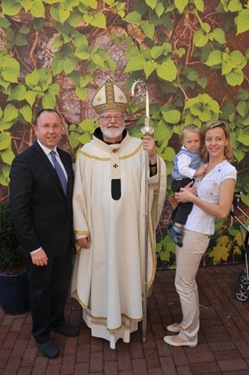
I pointed out that Massachusetts has the 6th largest Italian-American population in the United States and they are a very important part of our local church.
We’re very pleased to be able to congratulate them and celebrate this birthday celebration of the Italian state.
– – –
On Wednesday, I met with the bishops of the Boston Province. This time we had two new bishops with us.
Bishop Peter Libasci of Manchester, N.H., who will be installed on Dec. 8, came to join us for the meeting. It was a wonderful opportunity for him to meet all of the bishops of the province.

Bishop Libasci visited me recently at the Cathedral rectory
We had the new Eparch of the Melkite Diocese in Newton, Bishop Nicholas Samra, with us as well. He replaced Archbishop Cyrille Bustros, who is now the new Archbishop of Beirut, Lebanon.

For this meeting, we also invited the major superiors of mens’ religious communities from the region. Periodically, we, as the group of bishops, meet with the major superiors of the region and this was one such occasion. I was pleased that even the abbot of St. Joseph Abbey in Spencer was able to be with us.
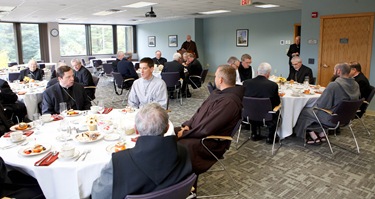
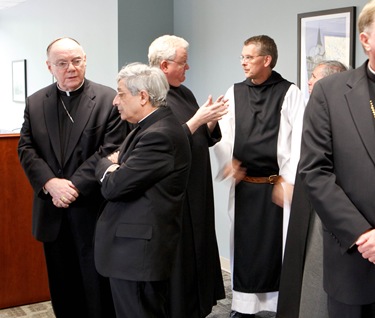
We’re very grateful for the presence of so many different religious communities of men who, by their charism and spirituality, enrich our Church. They are so generous in helping out in the parishes, retreats and many other ministries of the archdiocese and the other dioceses of the region.
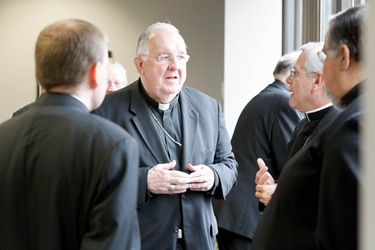
– – –
We are very pleased that this week the Campaign for Catholic Schools was able to announce a $1 million grant from the State Street Foundation, the grant making arm of State Street Corporation.
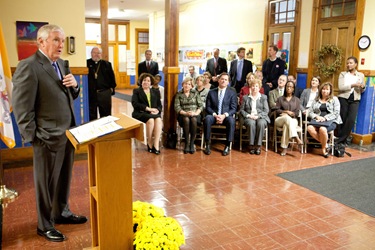
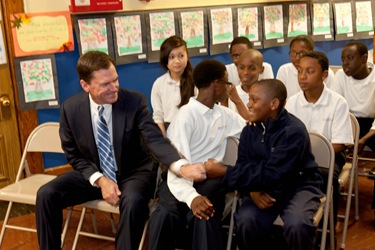
Jay Hooly, State Street’s chairman with some JPII Academy students
The grant will benefit the middle school programs and professional development at the Pope John Paul II Catholic Academy in Dorchester and Mattapan, which has a very culturally and racially diverse enrollment of 1,300 students. In fact, it is the largest elementary school in Boston.
We are very grateful to the Campaign for Catholic Schools, State Street and all of those who are helping us to raise money for our Catholic schools.
Catholic schools are one of the most important ministries of the archdiocese and we are committed to do everything possible to promote their Catholic identity and their academic excellence, so that present generations and future generations of Catholics will have the opportunity for a sound Catholic education.
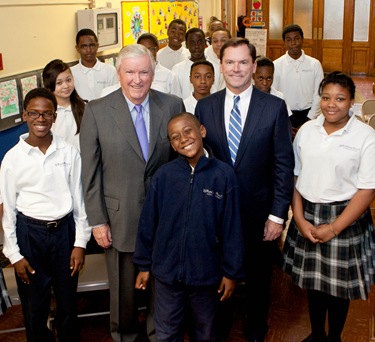
– – –
And next week we look forward to the first commemoration of the feast day of Blessed John Paul II on Oct. 22.
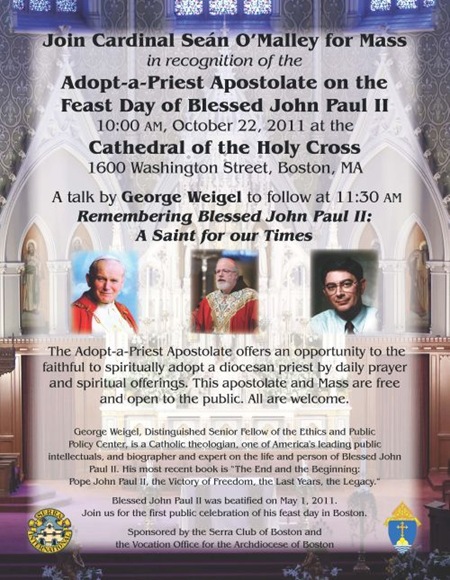
We are marking it in Boston by a special Mass organized by the Serra Club with the help of our vocations office. The Mass will be at the Cathedral at 10am, followed by some light refreshments and then a talk by George Weigel, who was a personal friend and the designated biographer of Blessed Pope John Paul II.
Until next week,
Cardinal Seán
